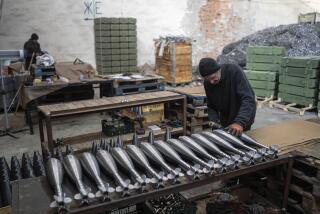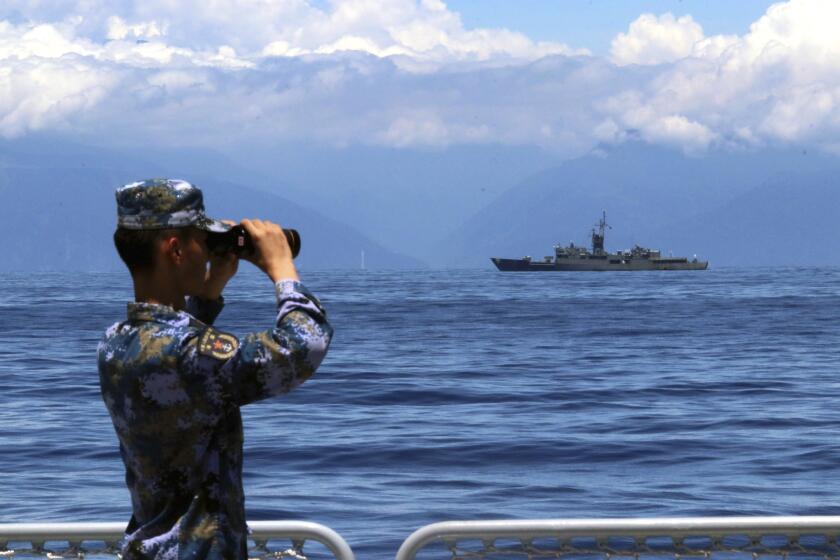Army in Tatters May Threaten Russian Reform
- Share via
MOSCOW — Brutalized, demoralized and dangerously politicized by the controversial war in Chechnya, the Russian army is in the throes of its worst crisis since World War II.
The proud Soviet army that kept Europe in fear for four decades has been slashed, starved and shoved haphazardly back within the borders of Russia. Reforms promised three years ago have not even begun. And the prolonged and humiliating conflict in Chechnya has left little doubt that the army trained to fight World War III in Europe is painfully unprepared to defend shrunken borders or to squelch ethnic conflicts inside the former Soviet Union.
American hawks and jittery East Europeans may be relieved and even thrilled to see the Cold War superpower bogging down in Chechnya and seemingly incapable of posing a conventional armed threat to the West. But Russian and Western military experts warn that the weak and disgruntled Russian army could create new problems, menacing Russian reform and unraveling the post-Cold War security structure.
U.S. military officials are worried that the decline in Russia’s conventional forces will increase its reliance on nuclear weapons. “It will place greater emphasis on the Russian military’s clinging to their nuclear forces, even more so as a psychological evidence of their continued claim to major-power status,” Lt. Gen. James R. Clapper Jr., director of the U.S. Defense Intelligence Agency, told the Senate Armed Services Committee last month.
In worst-case scenarios floating through Moscow these days, Russia could use tactical nuclear weapons in conflicts that a stronger army would fight by conventional means.
“Russia would either have to capitulate early and on humiliating terms or resort to use of nuclear weapons in an array of conflicts, where before, in Soviet times, it would have been unthinkable to use nuclear weapons,” said Pavel Felgenhauer, a military analyst for the newspaper Sevodnya.
Russia’s heightened sense of insecurity could also torpedo arms-control agreements--a development analysts say is becoming more and more likely. Despite President Boris N. Yeltsin’s calls for further disarmament, several existing arms-control pacts, including the 1991 Strategic Arms Reduction Treaty (START II), the Conventional Forces in Europe treaty and other security agreements, are now threatened by a balky Russian Parliament and Russia’s changing view of its security needs.
Early evidence of how vulnerable the army feels came in a survey of 615 high-ranking Russian officers last summer in which 57% agreed with the statement that “due to its internal instability, Russia would not be able to rebuff an aggression.”
And that was before the fratricidal war in secessionist Chechnya, a conflict that Russia’s defense minister boasted would end in a day but that is now heading into its third month.
Most immediate are fears of what might happen when a factionalized Russian army, bathed in blood, comes home from Chechnya. Military unrest and outright insubordination are no longer out of the question, Russian experts say.
More than 200,000 officers, many of whom question why they were ignominiously yanked out of Eastern Europe and the Baltics, still do not have apartments in Russia and are forced to live with their families in barracks. Some who are now fighting in Chechnya hope to be rewarded with better housing--and will probably be bitterly disappointed, because the small 1995 military budget is unlikely to improve their lot.
Moreover, Defense Minister Pavel S. Grachev is widely despised. Known throughout the armed forces by the nickname “Pasha Mercedes,” he is dismissed outside the army as a lightweight. Top generals have called for his resignation.
Now Grachev is embroiled in a corruption scandal over a multimillion-dollar German bank account held in the name of the Russian Defense Ministry. His job is in doubt, and his credibility as a military reformer is nil.
Like the Afghan War veterans before them, the soldiers and officers coming home from Chechnya will not return to a grateful nation. Some people already call them criminals, as reports of looting and atrocities by Russian forces in the largely Muslim republic multiply. And although most Russians see the 18-year-old soldiers as victims, not perpetrators, respect for the army has sunk deeply.
Russia has never had a tradition of military coups or military intervention in domestic matters. But Yeltsin blurred the line between military and civilian affairs by sending an army of 40,000 to Chechnya. And after the unprecedented spectacle of five top generals in uniform publicly opposing the Chechnya operation, the danger of powerful military figures playing politics can now no longer be dismissed.
“Today, for the third time in three years, we have the political leadership bringing the army in to settle what is basically a political conflict,” said Sergei M. Rogov, a military analyst at Moscow’s U.S.A.-Canada Institute.
In August, 1991, hard-liners called out the Soviet army to overthrow then-President Mikhail S. Gorbachev, but the tank drivers wound up hugging protesters in the street. In October, 1993, Grachev’s army was almost as reluctant to defend Yeltsin against an armed revolt by his enemies in Parliament.
But the indiscriminate assault on rebels and civilians in Chechnya--Russians as well as Chechens--has broken a psychological barrier for the military, Rogov argues. “What can stop them now?” he said.
“This war has brought the army into the center of political decision-making, because this is now an army that won’t stay in its barracks if it’s called to bring tanks into the streets,” Rogov said. “The question is, against whom?”
That the army is disgruntled should come as no surprise, because officers and soldiers in the war zone openly complain that they are being used as cannon fodder. Mounting evidence does suggest that Grachev and the other generals ordered untrained troops into the Chechen capital, Grozny, prematurely, indifferent to the casualties in an urban hell that is now being compared to the World War II battle for Stalingrad.
Grachev has been known to try to impress important visitors by ordering his paratroopers to jump in unsafe wind conditions, resulting in injuries. Western military observers say a political decision to invade Grozny earlier than planned--apparently to please Yeltsin--would have been “in character” for Grachev.
Further evidence of a precipitous decision to storm the rebel capital on New Year’s Eve came from Federal Counterintelligence Service Director Sergei V. Stepashin. He has claimed that his agency gave army commanders maps of Grozny and the warren of tunnels under the rebel presidential palace--but that field commanders didn’t receive them in time.
“At the very start of the decisive attack late Dec. 31, commanders at the headquarters in Mozdok were perfectly aware that the federal troops were not prepared to take Grozny,” said a general assigned to the Russian General Staff who requested anonymity.
A bitter inter-army rivalry led ground force commanders to reject a plan to have the better-trained paratroopers encircle the city and force it to surrender, the general said. Instead, they opted for an armored ground attack that was supposed to bring glory to the ground forces, but it cost many more lives.
On New Year’s Eve, one ground commander drank a toast not to the defeat of the Chechen enemy but to the defeat of the paratroopers, the general said.
In the ensuing chaos, Russia’s government aircraft bombed its own infantry, and soldiers in some units said more of their fellow servicemen were killed by friendly fire than by Chechens.
According to Grachev, 534 men were killed in the initial battle for Grozny. As of Feb. 9, 1,020 troops were officially listed as killed, out of a front-line fighting force estimated at 15,000. The unofficial toll is believed to be much higher.
The Soviet army always fought by sheer mass of numbers, taking casualties that its opponents could not have borne and still advancing. The fate of conscripts in Chechnya seems little changed.
But the newly independent Russian media are broadcasting the chaos and carnage of this war into every Russian living room. Some of it is even bloodier than what Americans saw during the Vietnam War. The influential TV program “Podrobnosti” even aired footage of a wounded Russian soldier dying on camera--something that would have been unthinkable only a few years ago. And draftees have given frank interviews about how badly the war is going.
An estimated 3,000 soldiers have deserted--some after their parents came to fetch them home. There are widespread reports of soldiers and officers refusing to go to Chechnya. A recent survey, albeit unscientific, found that 30% would refuse to deploy and 22% would try to wiggle out of duty there.
Officer after officer bemoans the decline of military honor. Chechen fighters bent on revenge claim to have purchased the names of bomber pilots from their commanders--and express amazement at the officers’ willingness to betray their men. Rebels reportedly claim to be buying Russian weapons from renegade Russian officers.
Even an army in such an unpleasant mood is considered unlikely to march on the Kremlin and depose Yeltsin. But experts say disgruntled officers could unite in the next elections with politicians more sympathetic to the army.
Two outspoken generals, Alexander I. Lebed and Boris V. Gromov, are mentioned as possible presidential candidates in 1996. Other officers are reportedly forming their own political alliances.
“The generals are not simply active in parties and factions interested in army life,” the General Staff source said. “They choose parties and factions that are backed by different banks or industrial groups.”
The deeply factionalized ground forces are divided not just within the upper ranks but also between the army’s haves--whose comrades suspect them of corruption--and the resentful have-nots, said Eugene B. Rumer, a Moscow-based military analyst for RAND Corp. Moreover, regional commanders may now owe more allegiance to local political bosses than to Moscow, he said.
Fortunately, the Strategic Rocket Forces, which control most of Russia’s nuclear weapons, are considered to be united and relatively well run. But the Russian navy, which is also nuclear, is said to be in utter decline.
Everyone agrees that Russia needs a smaller, more mobile and more professional army. In a recent address to Parliament, Yeltsin made military reform a top priority. But experts warn that an army so degraded and divided cannot possibly reform itself. The Soviet Union had 1,800 generals; Russia has about 2,500. Military reform will cost many their jobs.
Even Western experts hope the Russian army will shape up.
“I don’t think we want a weak Russia, and we certainly don’t want a weak Russia whose military is falling apart and with unguided missiles flying off,” Rumer said. “That’s worse than a bad, mean Russia.”
More to Read
Sign up for Essential California
The most important California stories and recommendations in your inbox every morning.
You may occasionally receive promotional content from the Los Angeles Times.










